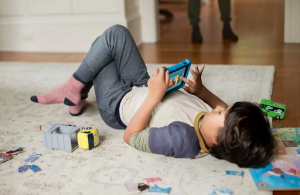
Alicia, 10 years old, stared blankly at the computer screen while her Teacher shouted at her. She knew what she was doing was wrong, but she couldn’t help herself. It was time for online class, but she was watching her favorite streamer on YouTube instead.
Finally, tired of her Teachers’ shouting, she turned off Zoom, and started playing. Her mother, Mrs. Lim, came into the room.
“How did you circumvent the child lock? Your Teacher called. You’re supposed to be in class, not on YouTube or playing!”
Alicia did not answer. She continued shooting digital aliens on her screen.
“That’s it, I’m taking away your laptop until you learn to discipline yourself.” Mrs. Lim said, scooping up the laptop.
Alicia screamed, and screamed, and screamed.
Mrs. Lim didn’t know what to do. She quickly left the room while Alicia lashed out at her pillows and dolls.
Later, when Mrs. Lim came to check on her, Alicia was gone.
She had run away from home.
Ever since schools switched to online learning, Parents have been complaining that their Children are getting really addicted to the internet. In many cases, former star students were now slaves to their screens.
Another unfortunate side effect is that many of these addicted students have also lost all sense of direction. They no longer have any hobbies, or goals, besides gaming or watching videos online.
Research shows that a staggering number of Children are fighting cyber-addiction — Up to 74.7% of high school students suffer from internet addiction. For Junior High School, that number was 65.5%.
Unfortunately, addiction is just one of the many problems associated with overusing gadgets and the internet. Our Children are also threatened by unfit and sexual online content and many Children struggle with cyberbullying on a daily basis.
So, how do we help our children? To do that, we must understand why Children become addicted in the first place.
Game and app designers have deliberately designed their games so Children spend more time on them. Modern games and apps are designed so we get a rush of serotonin, adrenaline, and dopamine when we play. These are the “feel good” chemicals everyone desperately craves for.
You see, whenever we “level up” or obtain a minor achievement, the app or game rewards us by giving us flashes, bells, whistles and fireworks. These really get our juices flowing.
When I first started as a Guru Besar, I was often asked by parents — “How do I help my Child’s addiction?”
Back then, I answered, “Simple, just get paper into their hands. Books, comics, or magazines. As long as they’re reading!”
It was the worst advice I’d ever given. No, it doesn’t work.
Why is that bad advice? It’s because I’m asking the Child to compare the flashes, bells, whistles and fireworks every 5 minutes in an app, to a boring old book.
Traditionally, we study and work hard because that monthly pay slip, or that favorable report card gives us the encouragement to put in more effort. In other words, we are motivated to keep working hard because everyone wants to “feel good”.
Apps and games give Children the same effect, without much effort.
“Why should I study?” they ask. Convincing them to work hard for the promise of a better future is an uphill battle, because they can be happy now by just getting onto the internet.
Alright, where do we go from here?
First, we cannot enforce discipline if the boundaries and rules have not been set. So, let’s sit down with our Children and collaborate to establish daily internet time and limits.
Secondly, help them develop goals. Why is this important? Because we have to be prepared for this question, “Why should I listen to you?”.
If you answer, “Because it’s my house, my rules,” you’re not going to get very far. We have to connect their good behavior with how it will benefit them in future.
Example, “We need to learn discipline so you can be an accurate Engineer in the future.”
Thirdly, if you’re really serious about helping your children with their addiction, you have to walk the talk. This means spending “no-screen” time together as a family. You could try reading together (everyone reads their own books together in the living room). For me, I love cooking together with my sons.
Are these methods effective in helping your Children? Yes, but be prepared for breaches of boundaries and tantrums. Enforce the rules consistently. If we can lead by example, you’ll see a huge improvement in your Child’s behavior, really soon.
Teacher Kean is an experienced Parenting Trainer, specialising in parenting skills and classroom management techniques. The views expressed here are the writer’s own.









